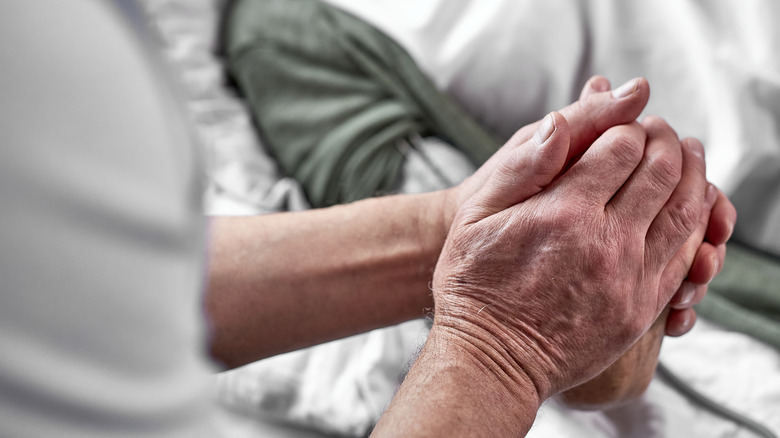What Happens To Your Poop When You Die?
In a person's final moments, we often focus on what's happening physically outside of the body. Does their breathing slow? Are their eyes closing? Does their skin feel cold? What we might think less about, however, is what's going on internally. This includes what's happening to the different bodily systems, such as the circulatory system, musculoskeletal system, and digestive system.
If undigested food remains in the body at one's time of death, it's natural to wonder what becomes of the waste. When a person dies, all organ functioning comes to a stop. Depending on the cause of death, this functioning is usually on the decline for some time prior to one's passing rather than occurring suddenly all at once. For example, during the dying process, a person may experience urinary incontinence or find that bowel movements have become more challenging (constipation), according to the Cleveland Clinic. As soon as we die, however, poop is promptly expelled from the body.
Muscle relaxation may cause a person to poop after death
Once death occurs, any constricted muscles immediately relax — and the bowel muscles are no exception, explains the Cleveland Clinic. As a result, stool may be released from the body. But exactly how much stool can we expect to be discharged? Jeff Jorgenson, director of Seattle-based funeral home Elemental Cremation and Burial, told Women's Health that it won't be an excessive amount of poop. Rather, it's more likely to take the form of leakage.
After the muscles relax, a person begins to enter rigor mortis, in which the opposite occurs. The muscles start to stiffen due to the lack of adenosine triphosphate (ATP) being produced in the body. ATP helps prompt our muscles to relax, but without it, our muscles tense up and remain solid. The onset of rigor mortis takes place within a matter of hours following death and can take up to 12 hours to affect the larger muscles. Within days, as body tissue decays, the hardened muscles will return to a relaxed state.
What to do if a dying person is experiencing gastrointestinal discomfort
If a loved one is experiencing gastrointestinal discomfort from constipation towards the end of life, stool softeners may help alleviate symptoms (via Cleveland Clinic). Bed pads can also be used to help absorb any bodily fluids. While defecation is not unusual following death, it can be difficult for friends or family to witness. Therefore, healthcare staff may ask the family to step out while they clean the deceased person and any soiled bedding, reports The Science Times.
As we near death, some people take comfort in preparation and knowing what to expect, both emotionally and physically. This can be true for caregivers as well as the dying individual. If possible, having a healthcare team can be beneficial to support the needs of the person dying as well as their family. Hospice professionals can help tend to the patient's medical needs, provide comfort, and preserve patient dignity.



